Detective Constable Degree Holder Entry Programme (Detective DHEP)
Already hold a degree or in the final year of your study? Eager to pursue a career in investigation? Aspire to manage your own investigations from start to finish? Motivated by a desire to do the right thing and get justice for victims? Typically described as inquisitive, observant, tenacious, methodical, dedicated, resilient, attention to detail oriented with solid research skills combined with confident decision-making? The Detective-DHEP could be for you.
The Detective-DHEP is a rigorous, intensive and demanding two-year fast track to the Detective Constable (DC) entry route. Like the Police Constable-DHEP (PC-DHEP), it is a work-based programme, supported by on and off the job learning. On successful completion of your probation, you will achieve a Graduate Diploma in Professional Policing Practice plus have acquired the additional PIP2 learning, training and accreditation to qualify you as a Detective Constable. The course requires commitment and dedication to both serving the public and meeting the demands of the development programme, whilst offering a fantastic opportunity for you to continue to learn beyond your initial degree and earning a salary as a fully warranted police officer from your first day.
The starting salary for all new recruits is £31,551 (which includes £3,000 South-East allowance). On the current system, after seven years of service the salary will be in excess of £49,044 (which includes £3,000 South-East allowance).
Find out more about becoming a Police Officer including pay and benefits, life ‘on shift’ as a Response Officer (which you will experience as part of your DC training), Military Resettlement, how we will be Supporting You and how we Value Difference.
Investigation at TVP
With a force size that guarantees a broad range of crime and a reputation for solid investigations there is no better place than TVP to become a detective. We have an established, comprehensive investigative structure and are the host force for a number of South-East regional crime teams; for example Counter Terrorism Police South-East. As a detective, you will deal with some of the most serious and complex crime possible including serious assaults, domestic abuse, child protection, fraud, homicide, cybercrime, county drugs lines and crimes against vulnerable people.
As a Detective, no two cases or days are the same. You are responsible for managing and conducting complex investigations from initial crime scene management to the verdict being delivered at court. Your role will vary from interviewing suspects, identifying witnesses, handling forensic evidence, preparing and submitting case papers, attending court and being the point of contact for victims of crime as you work to uncover the truth. Partnership working is key as you collaborate with social care, health teams and schools, working alongside your uniformed colleagues to build the strongest case and achieve justice for victims.
Learn about our Investigations
TVP has a rich history of first class investigation including associations with the 1963 Great Train Robbery and baby farmer Amelia Dyer from the 1890s, more recent cases have included Op Naseby and Op Navigator. Learn more about these challenging cases:
The force is also featured in the Channel 4 British true crime documentary series ‘Catching a Killer’ which shines a light on five of our recent and complex cases, following Detectives in our Major Crime Unit as they investigate a murder.
Meet our detectives
Programme outline
View the DC-DHEP programme outline – please note that Thames Valley Police is currently working to ensure that all our documents fully meet all accessibility requirements.
Watch: Detective Chief Inspector Cat McKay introduces the Detective DHEP Programme (Opens in new window)
Year one: A blended learning programme delivered by TVP and Bucks New University with an initial learning phase based at TVP’s Training Centre in Sulhamstead, Reading or HQ North, Kidlington. This would then be followed by a 16 week tutoring phase (in uniform) after which student officers will go straight into a detective role within their designated investigation team where further tutoring and operational work based learning will take place. In year one operational training will include officer safety training, making an arrest and how to conduct a stop and search, amongst other things. You will also be required to complete four academic assignments*. Two of these are completed during the initial learning phase, the remaining two are to be completed whilst operationally deployed during assigned periods of Protected Learning Time**. During year one student DCs will also apply for and take the National Investigators Exam (NIE).
Year two: Builds on the first year with more operational / work based learning within your PCT. Student DCs will start to build their Operational Competence Portfolio (OCP) – learning, applying and evidencing your core policing skills. You will need to complete all elements of the PC-DHEP (four academic assignments* whilst operationally deployed during assigned periods of Protected Learning Time**) achieving a Graduate Diploma in Professional Policing Practice with the additional PIP2 learning, training and accreditation to qualify you as a Detective Constable.
* Academic assignments are typically made up of the following: Coursework (essays / reports / portfolios), presentations / posters and time constrained examination / set exercises.
** There is sufficient protected learning time (PLT) built into all the PCDA/DHEP programmes throughout the 2 or 3 years in order to successfully complete the course and achieve the relevant qualification. Part of this PLT is reserved for learning (off the job training) to be delivered to the student and part is reserved as independent study time to assist in the completion of the academic assignments. However, students may wish to spend additional time on completing assignments outside of these allocated hours.
Your Career In Investigation
After enrolling on the program you will complete various aspects of initial learning and having progressed as expected you would be placed in to one of the following departments where an experienced detective will tutor you:
Priority Crime teams
PCT are dedicated to investigating serious acquisitive crime, namely, Burglary, Robbery, and vehicle crime. The majority of the work centres on Prolific Priority offenders, knife crime, and Organised Crime Groups- those that cause most harm in the community. The very nature of priority crime means that the departments are proactive in their approach, which enables operations to be planned, and partnerships formed in order to deter and disrupt offenders before crimes occur. PCT’s offer a variety of work both proactive and reactive, working with both internal and external partners.
Criminal Investigation Department
CID are responsible for investigating serious and series crime concentrating on offences such as serious violence and sexual assaults, modern day slavery, firearms and unexplained death. The CID are flexible and proactive in their approach to arrest, disrupt and prosecute those involved in serious criminality even where they cross local and force boundaries. They investigate a wide range of offences giving variety and opportunity for a wider understanding of specialist teams and the tactics available to secure the best evidence against dangerous and organised criminals. Specialised training, experience of Crown Court trials, liaison with technical and forensic partners, and support to Major Crime Investigations is all part of this role.
Domestic Abuse Investigation Units
DAIU’s investigate all high-risk domestic abuse criminal cases and some medium risk ones, and are responsible for managing the risk associated with medium and high-risk cases. Detectives in DAIU hold some very serious investigations, up to and including attempted murder.
It is not just about domestic abuse, as they also have responsibility for investigating serious crimes committed against vulnerable adults and the ongoing protection of them in conjunction with partner agencies.
Having completed the Detective-DHEP program and requisite portfolios you become an accredited DC and a whole world of roles and opportunities opens up within some of our specialist investigative teams including some listed below. Whilst serving in all investigation departments there is the option to complete specialist courses such as being a Family Liaison Officer (FLO) where you might be deployed to a family of a victim of a homicide, or a negotiator, or be an enhanced suspect or witness interviewer.
Child Abuse Investigation Units
CAIU’s investigate offences involving crimes against children including interfamilial and position of trust offences as well as non-recent child abuse and predatory offenders, which on conviction attract significant sentences at court. Working with partner agencies, they seek to protect and look after the best interests of some of our most vulnerable members of society.
The Major Crime Unit
MCU exists to investigate the most serious of crimes such as: homicides, kidnap, complex or serial rape offences, corporate manslaughter, work related deaths as well as other serious crimes that would benefit from the setting up of a Major Incident Room (MIR). The MCU use the Home Office Large Major Enquiry System (HOLMES) to case manage major investigations.
Specialist Operations Units
There are a number of units within Specialist Operations that support other departments, or conduct their own investigations, such as Fraud owned by the Economic Crime Unit, or large scale drug supply by the Serious Organised Crime Unit. They focus on tackling the most prolific offenders within the Thames Valley area, supported themselves by other government agencies.
They are the Economic Crime Unit, Cyber Crime Unit, Dedicated Surveillance Teams, Force Pro-Active teams, and Serious and Organised Crime Unit.
Thames Valley Police are also part of Regional investigation teams, which are:
Regional Organised Crime Units
ROCUs were set up as part of a national network to tackle serious and organised crime. They work with police forces across the country, the National Crime Agency (NCA) and other national law enforcement agencies to tackle serious and organised crime.
The South East Regional Organised Crime Unit (SEROCU) is responsible for delivering specialist and niche capabilities to Thames Valley Police, Hampshire Constabulary, Surrey Police, and Sussex Police.
Counter Terrorism Policing, South East
CTPSE has responsibility for co-ordinating the four strands of the Government’s CONTEST strategy (Pursue, Prevent, Protect and Prepare) at a regional level as well as the TVP Force responsibility for ensuring the Pursue and Prevent elements are delivered locally. The aim is to create a more co-ordinated regional counter terrorist response, providing specialist support to police forces in Thames Valley, Hampshire, Surrey, Sussex and Kent.
In line with the Home Office counter terrorism strategy, known as CONTEST this regional Counter Terrorism Unit helps ensure the police service in the UK is better equipped to prevent and respond to terrorist incidents and investigate and prosecute those involved.
Detective DHEP – Frequently asked questions.
Eligibility
To apply for the Detective-DHEP, you must:
- be at least 17 years of age upon application but must be 18 years of age by your first day in the role,
- be a British citizen, or an EU/European Economic Area (EEA) national, Commonwealth citizen or foreign national with Indefinite Leave to Remain or Pre-Settled/Settled status and no restrictions on your stay in the United Kingdom,
- have a UK Level 6/degree qualification or equivalent (or be in the final year of study). Official results would be required before an offer of appointment is made,
- not have undertaken the College of Policing-licensed pre-join degree in Professional Policing,
- hold a full manual UK or EU driving licence by the time of formal offer,
- not have served any time in prison or youth detention (if you have a criminal conviction, it may lead to your application being rejected – we will take into account the date, nature of offence plus evidence of good character since the offence),
- be in good health and able to physically and mentally perform your duties,
- not have any piercings or tattoos which could cause offence,
- not have applied unsuccessfully for a Police Officer role within the past six months,
- live within 30 crow miles of two of our main police stations by formal offer of appointment. A degree of flexibility is expected in terms of postings as we may be forced to post to locations within policy parameters if organisational need dictates this.
Application Process
Typically, the process from initial application through to start date can take six to nine months and includes:
- Self-assessment questionnaire – we encourage all applicants to self-assess your eligibility prior to applying,
- Application – be prepared to apply
- National Sift (online) – taking approx. 1 hour to complete
- Proof of eligibility
- Online assessment centre – Interview/Written – taking approx. 3 hours to complete
- Force interview – panel interview led by a Senior Detective and including an additional assessment based on the skills required to be a detective. Please note ALL candidates (internal and external) will be required to do a panel interview
- Provisional offer
- Pre-employment checks including fitness test, BMI, medical, references and vetting
- Start date
Apply
Applications for Detective Constables are now closed, however you can register your interest for our programme and get notified when applications are live again and be given the opportunity to apply. We’re expecting the next recruitment phase to open in Spring 2024.
Online Assessments
National Sift and Online Assessment Centre
All candidates will undertake the new two-stage online assessment process. The first stage is referred to as the ‘National Sift’ and comprises a Situational Judgement Test (SJT) and a Behavioural Styles Questionnaire (BSQ). Candidates who successfully pass the ‘National Sift’ will then be Eligibility-checked by the Recruitment team. Candidates who pass Eligibility will progress to the Online Assessment Centre (OAC), made up of an online interview, a written assessment and briefing exercise.
The online assessment process
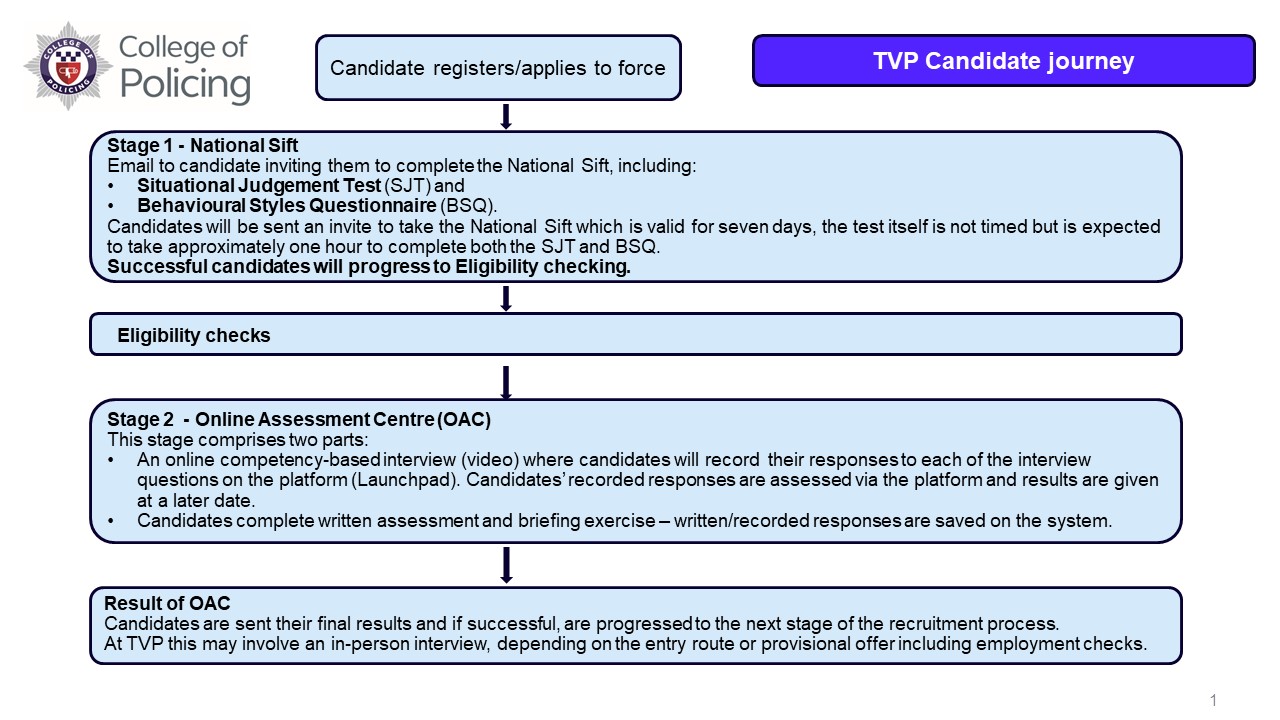
- Stage 1 – National Sift
The ‘National Sift’ comprises of two elements. First a Situational Judgement Test (SJT) followed by a Behavioural Styles Questionnaire (BSQ). Find out more in the National Sift document. Candidates who successfully pass the ‘National Sift’ will then be eligibility checked by the Recruitment team. - Stage 2 – Interview, Written Assessment and Briefing Exercise
Competency Based Interview: You will be asked a series of questions about how you have dealt with specific situations in the past. This is your opportunity to provide some examples of the key competencies and values that are important for police constables. You can use examples from both your work and your personal life. - Written assessment and briefing exercise
- Written assessment: In this exercise, you will assume the role of a police constable and will have to complete an urgent written task for your line manager. You will receive four items of information to help you with this task.
- Briefing exercise: In this exercise, you will assume the role of a police constable and will have responsibility for dealing with some issues presented to you. You will be tasked with providing a response to a number of questions in relation to this issue. You will be provided with preparation materials to consider your answer.
Please note that you will receive and be able to take the written assessment and briefing exercises separately.
Required Technology
You can complete the exercises on any internet-enabled device with a camera (laptop, tablet or phone), but to ensure full compatibility with the online platform, the following should be set up.
Your operating system should be Windows 7 (or higher) or Mac OS 11.0 (or higher).
Your Apple iPhone, iPad or iPod Touch should have iOS 8.0 or later installed.
Your Android device should have compatibility 4.1 (or higher).
Your browser should be the latest version of Microsoft Edge, Mozilla Firefox or Google Chrome. Please do not use Internet Explorer or Safari, as these browsers are not supported for the Online Assessments.
A strong internet connection via WiFi – if you have a weak connection, connect via an Ethernet cable.
Further Information
For further information on the recruitment process, please refer to the College of Policing’s online assessment candidate FAQ or contact TVP’s Police Officer Recruitment Team directly: assessmentcentre@thamesvalley.police.uk
How to apply
Please refer to the relevant entry route dropdown box above.
Useful information
- Self-assessment Questionnaire
- Recommended Medical Standards
- Eyesight Standards for Police Recruitment
- Body Mass Index (BMI)
- Vetting – Frequently Asked Questions
- A-level Equivalency Table
- English & Maths Level 2
- Competency and Values Framework
- National Sift COP Guidance
- Officer Rates of Pay
- Local Policing Areas
Contact us
If you would like to speak to our recruitment team about our Detective DHEP programme, please email us at RecruitmentPoliceOff@thamesvalley.police.uk

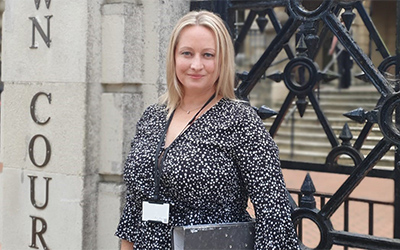
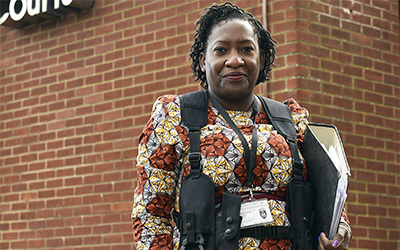
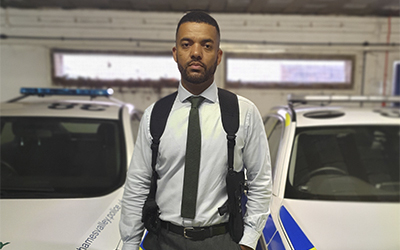
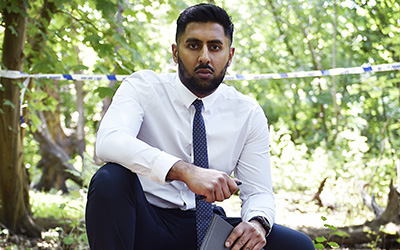
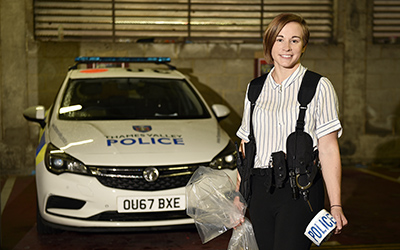
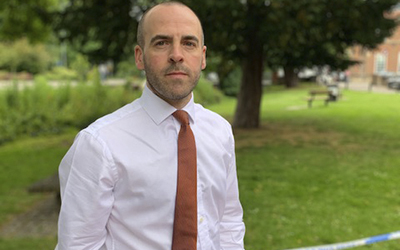
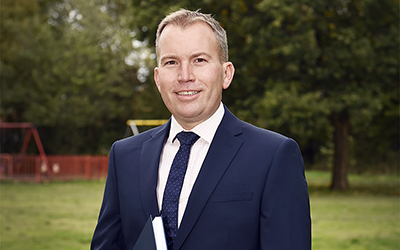
 Facebook
Facebook
 Twitter
Twitter
 Linkedin
Linkedin
 Instagram
Instagram